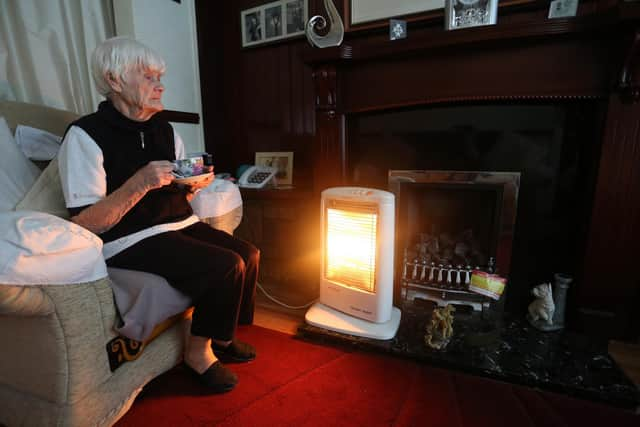Cost of living crisis: UK faces a humanitarian disaster as energy becomes a luxury – Poverty Alliance and Energy Action Scotland
Yet since Friday’s announcement by Ofgem that the energy price cap will rise by a further 81 per cent to £3,549 a year for the average household on 1 October, those with the greatest power to protect the country from an almost unprecedented level of hardship have singularly failed in their duty.
Almost three-quarters of households in Scotland could end up in fuel poverty as a result of this and further expected energy price cap increases. The hardship that this will inflict is almost unthinkable, and yet utterly real.
Advertisement
Hide AdAdvertisement
Hide AdInstead of responding to this looming catastrophe with the kind of action needed to shield people from being pulled under, most of those with the ability to take action have instead been notable only by their inaction. UK ministers have known that this moment was coming for months, and yet have put almost nothing in place to prevent this unfolding humanitarian disaster.
Where we have needed decisive interventions at a UK level, we have so far been presented with warm words and inadequate actions. Where we have required a recognition of the magnitude of the crisis, we have instead seen inertia. And when we have demanded compassion for the households across the country who simply do not know how they will heat their homes this winter, we have been confronted by a callous reluctance to act.
People who are already living on low incomes, people with essential medical needs, older people, disabled people, people with serious and underlying health conditions, and smaller households will feel the greatest impact.
People who were already struggling to heat their homes and stay afloat will now find themselves pulled even deeper into stress, anxiety, illness and poverty. Even before the Covid pandemic, more than a million people in Scotland were living in the grip of poverty. For them, the cost-of-living crisis has magnified – not caused – the hardship that they were already experiencing.


Community-based member organisations of both the Poverty Alliance and Energy Action Scotland have told us that the scale of hardship that is being experienced in communities right now – and the hardship that looks to be around the corner – is significantly higher than that witnessed during the pandemic. They have told us of the rising tide of debt, distress, and destitution that they are having to attempt to support people through.
But, despite their incredible efforts, they can only do so much, and risk being overwhelmed by the demands being placed upon them. Foodbanks are reporting unprecedented demand but their donations are drying up. Advice services are telling us of being underfunded and feeling helpless in the face of such crisis. And individuals experiencing poverty are speaking of their overwhelming fear at what more is to come.
This is an unfolding disaster that threatens to inflict even more poverty than the Covid pandemic. While policies like the furlough scheme and the £20 Universal Credit uplift took some of the roughest edges off the impact of the pandemic, no such policies of that scale have so far been implemented by the UK Government.
But it is not too late. The tide can be turned. The inadequacy of the social security system is not new, but in the current context the urgency with which it must be fixed is enormous.
Advertisement
Hide AdAdvertisement
Hide AdWe need a new, targeted emergency package of support that gets cash into the pockets of people on low incomes fast. That means significantly increasing low-income benefits like Universal Credit, as well as new payments to reflect growing need.
There is also more that the Scottish Government can do, like bolstering the Scottish Child Payment, Scottish Welfare Fund, Child Winter Heating Assistance and maximising the impact of its soon-to-be=delivered Low Income Winter Heating Assistance.
There is much to admire in the framework created to respond to fuel poverty in Scotland.
The Warmer Homes Scotland programme helps people in the most difficult circumstances but, with more than 700,000 households in extreme fuel poverty, it simply isn’t of the scale necessary. Social landlords have improved the levels of efficiency in the social rented sector; however, there has been little success in the private rented sector.
Insulation programmes for homeowners have slowed, reaching fewer and fewer homes. Our homes are amongst the poorest quality anywhere in Europe, our winter deaths amongst the highest. Now is the time to sweep away the barriers and ramp up the rate of improvement.
This is a moment of decision for government, and for all of us. Decades of falling wage values and cuts to social security have left people under constant pressure to make ends meet. We need to seize this moment and start to redesign our economy and rebuild our social security system, so that people have the incomes they need to live in dignity and security.
Failing to take the required action will not just be a political failure. It will be a colossal and catastrophic moral failure that will impact people’s lives for years to come. More than that, it will lead to a decline in people’s mental health and wellbeing that will take years to recover, and will lead directly to deaths this winter.
That such a thing could even be possible in 2022 in a wealthy country like the UK is grotesque. Energy should not be a luxury for the wealthy few. It is the duty of those with power, particularly whoever soon gains power in No 10 Downing Street, to prevent it from being so.
Peter Kelly is director of the Poverty Alliance and Frazer Scott is chief executive of Energy Action Scotland
Comments
Want to join the conversation? Please or to comment on this article.
